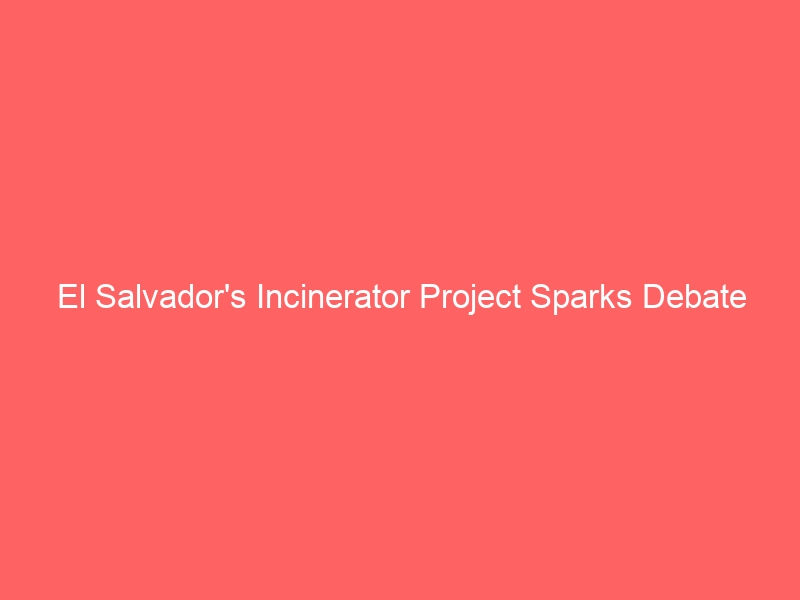El Salvador’s Incinerator Project Sparks Debate Over Waste Management
The Central American nation of El Salvador is currently facing a major environmental challenge when it comes to waste management. With a rapidly growing population, the country is struggling to find solutions for the increasing amount of waste that is being generated on a daily basis. As a result, the government has proposed the construction of a waste-to-energy incinerator, sparking a heated debate over the potential environmental and health impacts of such a project.
The Incinerator Project
The proposed incinerator project is part of the government’s plan to address the country’s waste management crisis. According to officials, the incinerator would be able to process a large amount of the country’s waste, converting it into energy that could be used to power homes and businesses. This would help to alleviate the pressure on the country’s already overburdened landfills and reduce the amount of waste that is being sent to them.
In addition to generating energy, the incinerator project is also being touted as a way to reduce greenhouse gas emissions and combat climate change. By burning waste, the incinerator would prevent the release of methane gas, a potent greenhouse gas, which is produced by organic waste as it decomposes in landfills. This would help El Salvador to meet its commitments to reduce greenhouse gas emissions under the Paris Agreement.
The Debate
While the government sees the incinerator project as a solution to El Salvador’s waste management problems, many environmental and community groups are fiercely opposed to the idea. They argue that incinerators are not a sustainable solution to the country’s waste issues and could pose significant health and environmental risks.
One of the main concerns is the potential release of harmful pollutants into the air from the burning of waste. Incinerators are known to emit a range of pollutants, including dioxins, heavy metals, and fine particulate matter, which can have serious health impacts on nearby communities. In addition, there are concerns about the disposal of toxic ash and other byproducts of the incineration process, which could further contaminate the environment.
Opponents of the incinerator project also argue that it will perpetuate a reliance on waste as a source of energy, rather than promoting more sustainable waste management practices such as recycling and composting. They believe that instead of investing in incineration, the government should focus on developing a comprehensive waste management strategy that prioritizes reduction, reuse, and recycling.
On the other hand, supporters of the incinerator project argue that it is a necessary and cost-effective way to deal with El Salvador’s mounting waste problem. They point to the success of waste-to-energy incinerators in other countries as evidence that the technology can be used safely and effectively to manage waste and generate energy.
Frequently Asked Questions
Q: What is the current state of waste management in El Salvador?
A: El Salvador is currently facing a waste management crisis, with limited infrastructure for handling and processing the increasing amount of waste being generated by its population.
Q: Why is the government proposing the construction of an incinerator?
A: The government sees the incinerator as a way to address the country’s waste management issues by converting waste into energy and reducing the burden on landfills.
Q: What are the concerns about the incinerator project?
A: Opponents are concerned about potential health and environmental risks from pollutants emitted during the incineration process, as well as the perpetuation of a reliance on waste as a source of energy.
Q: What are the arguments in favor of the incinerator project?
A: Supporters of the project believe that it is a necessary and cost-effective way to manage waste and generate energy, and point to the success of similar projects in other countries.
In conclusion, the proposed incinerator project in El Salvador has sparked a heated debate over the country’s waste management strategies. While the government sees it as a solution to the mounting waste crisis, opponents argue it poses significant health and environmental risks. As the debate continues, it is essential for all stakeholders to consider the long-term impacts of the incinerator project and work towards a sustainable waste management solution that benefits both the environment and the community.








